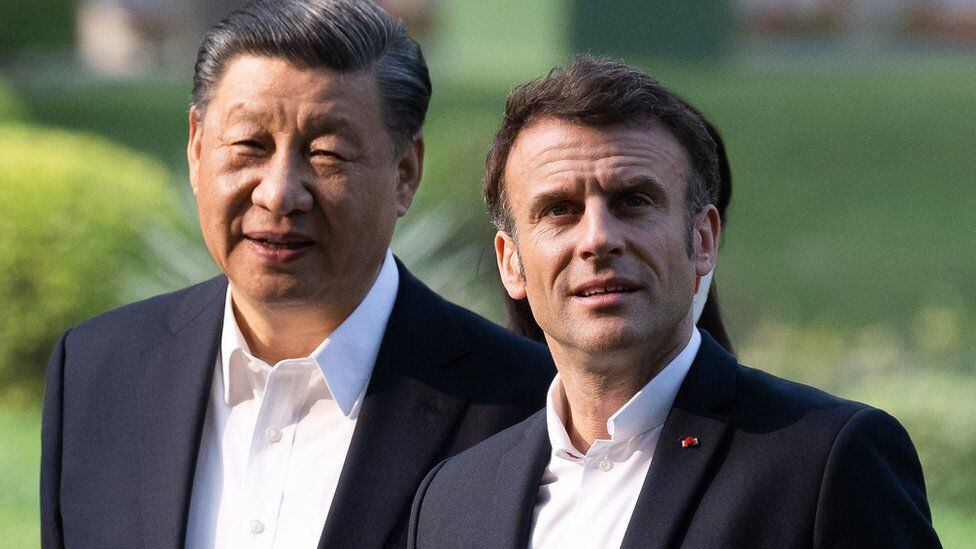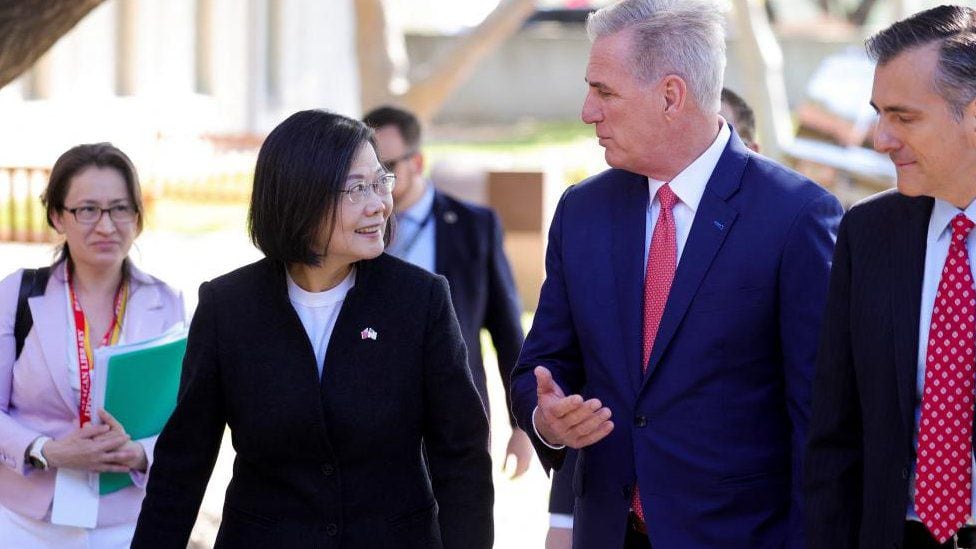the chinese president, Xi Jinpingand the Frenchman, Emmanuel Macron, had tea together last weekend in the city of Canton.
Hours after the meeting, in which both advocated peace in Ukraine, Chinese warplanes flew over the Taiwan Strait in a new show of military muscle by Beijing.
LOOK: What do they say in Paraguay about the construction of the megahighway that will link two oceans through their “green hell”
China’s moves to intimidate Taiwan began a day after the French president’s state visit, which marked a milestone in Chinese diplomacy.
This succession of events is the most recent example of the two faces that China presents to the world: the one with the dove of peace at the international level and the one with the bulldog that bares its teeth coveting what it considers its territory.
But is this strategy sustainable?
The cordiality offensive
Since coming out of the covid lockdown, China has wasted no time on the diplomatic front.
In recent months, Xi has met with Russian President Vladimir Putin; he received several world leaders such as Brazilian President Luis Inácio Lula da Silva, who arrived this week, dispatched a high-level envoy to Europe and presented a 12-point solution to the war in Ukraine.
Also mediated the détente agreement between Saudi Arabia and Iran, in what is considered one of his greatest diplomatic conquests. It is especially significant that he has achieved this in the Middle East, where the US intervention has been characterized by its constant problems and failures.
In parallel, Beijing has put forward several proposals for international security and development, a clear sign that is courting the so-called “global south” as it did with the previous initiative of the Silk Road, which left investments of billions in various countries.
He even seemed to scale back his traditional confrontational “warrior wolf” rhetoric by sidelining controversial diplomat Zhao Lijian and promoting more moderate figures such as Wang Yi and Qin Gang, though Xi continues to encourage his envoys to display a “fighting spirit.”
The “Chinese Dream”
This diplomatic push that positions China as a key player in the global power game may have its roots in the “rejuvenation of the Chinese nation,” an age-old nationalist concept that sees the “Middle Kingdom” reclaiming its central position in the world. .
Articulated as “the chinese dream” by Xi when he came to power, this concept reflects the current leadership’s “confidence in its own path and focus on modernization,” said Zhang Xin, an associate professor of politics and international relations at East China Normal University.
But it’s not just about spreading the gospel of the Chinese way of doing things; it is also largely aimed at securing global economic ties.
“Xi knows that you can’t rejuvenate the Chinese nation without a good economy,” says Neil Thomas, China policy fellow at the Asia Society Policy Institute.
“China needs to continue to grow while gaining diplomatic influence. You can’t do that if you reject the West, since you need to maintain good economic relations. That requires diplomacy and moving away from the more ‘warrior wolf’ aspects.”
The main reason for the recent diplomatic surge is that China feels increasingly under siege.
The “multipolar world” as an objective
Mistrust in the West has resulted in stronger defense alliances between other countries such as Aukus and Quad, as well as moves to restrict Beijing’s access to advanced technology.
In March, Xi accused the “US-led Western countries” of promoting the “containment, encirclement and suppression of China, which has brought unprecedented serious challenges to our country’s development.”
It’s a sentiment that has grown in the past year with the war in Ukraine and the strengthening of ties within NATO, said Ian Chong, an analyst at the Carnegie China Center.
“Beijing has realized that the United States has many powerful friends. The Chinese feel this containment more, which gives them more momentum to break it,” he said.
That is why a key pillar in China’s strategy is the “multipolar world”, that is, with multiple centers of power.
Xi touts this as an alternative to what he calls “American hegemony” which he says has pushed countries into power blocs and aggravated tensions.
This was evident during Macron’s visit, when the Chinese president urged Europe to think of itself as an “independent pole”, while echoing his French counterpart’s rhetoric on “strategic autonomy”.

While Beijing argues that a more balanced distribution of power would make the world a safer place, others see it as an attempt to move countries away from the US orbit. and shore up China’s influence.
China often highlights the failures of US foreign policy in Iraq and Afghanistan, while projecting itself as a country with no blood on its recordwhich implies that he is a better candidate to lead the world.
A common argument in the Asian giant’s rhetoric is that communist China has never invaded another country or engaged in proxy wars.
However, Tibet was annexed, participated in the Korean and Vietnam warshas been accused of usurping territories in recent border clashes with India and has maritime disputes with several countries in the South China Sea.
He also views the independent nation of Taiwan as a breakaway province and has vowed to take it over by force if necessary.
The results
So is the friendliness offensive working?
The “global south” and other countries not aligned with China or the US would probably welcome it.
China is launching a non-coercive mediation strategy that has “broad appeal,” Zhang says.
This non-interference idea sounds good. in states with authoritarian governments.
“Many countries are not focused on democracy and human rights, and China would be their patron in global governance,” Thomas says.
However, “it’s unknown if they match up enough to take a risk for China,” Chong says.
There are red lines that they would not cross, as seen in the UN vote on the Ukraine war, where most countries chose to condemn the invasion while China abstained.
For their part, the United States’ traditional allies, such as Europe, continue to debate how to fit China’s proposals.
Some do not appear to be easily swayed, such as European Commission President Ursula von der Leyen, who took a tougher tone towards Xi by accompanying Macron to the Chinese capital.
Others more interested in preserving their countries’ economic relations with China have shown greater openness.

During his trip, Macron was received with high honors by the Chinese. Even with a careful military parade.
In an unusual move, Xi accompanied him to the southern city of Guangdong, where he said they were “close friends.”
Macron later told reporters that it would not be in Europe’s interest to engage with Taiwan and “stay caught in crises that are not ours“.
He has since defended his comments, saying that being an ally of the United States does not mean becoming its “vassal.”
For some, this is proof that Xi’s courtship has worked.
Europe is becoming the “central battleground” of US-China relations as a “swing state” in which whoever wins their support will emerge victorious, according to Thomas.
But for now, Macron he is an outlier among European leaders.
His comments drew criticism and Germany sent its foreign minister to Beijing to stress the EU’s tougher stance on Taiwan.
While Europe weighs its bets between the US and China, Thomas notes, “it knows that the best horse is still the US.”
The other side of China
However, it is on the Taiwan issue that China’s cordiality offensive begins to unravel.
Beijing’s latest military exercises, in response to last week’s meeting between Taiwanese President Tsai Ing-wen and US House Speaker Kevin McCarthy, deployed the usual Chinese tactics of send fighter planes and ships and simulate attacks on the island.
Taiwan denounces that China has intensified incursions into its air defense zone in recent years, with hundreds of flights by military aircraft each month.
Analysts say such moves contradict China’s message when it claims to be a peacemaker.
While others see it as a military aggression, Beijing has always insisted that they are defensive moves and therefore an internal matter.
But a war over Taiwan would have global consequences, Chong asserts.

The island produces 60% of the world’s semiconductors and is home to some of the busiest shipping lanes and undersea telecommunications cables that connect Europe with Asia.
Nor can Beijing ignore the fact that if a conflict breaks out, it would be blamed – at least in part – for destabilizing Asia.
Most analysts believe that China has no intention of invading Taiwan any time soon.
But there is concern that escalating military action could lead to a dangerous miscalculation as a war with the United Statessince Washington is committed to helping in the defense of Taiwan in case the island comes under attack.
“Xi Jinping is trying to regain his (China’s) diplomatic presence while projecting strength on the Taiwan issue. It’s going to be increasingly difficult to walk the line dividing both goals as concerns grow among third countries about a attack on Taiwan,” says Thomas.
As Beijing intensifies its campaign to woo the world, it will also see its actions subdued. to increased scrutiny.
Soon he will have to choose between being the dove of peace or a hunting dog.
Additional reporting by Grace Tsoi.
Source: Elcomercio
I am Jack Morton and I work in 24 News Recorder. I mostly cover world news and I have also authored 24 news recorder. I find this work highly interesting and it allows me to keep up with current events happening around the world.

:quality(75)/cloudfront-us-east-1.images.arcpublishing.com/elcomercio/ZZGSZPSSXNCCDFMQGE6EZ5TUUQ.jpg)

:quality(75)/cloudfront-us-east-1.images.arcpublishing.com/elcomercio/FJIVNGROJJCCZN2FACNMPP4ID4.jpg)
:quality(75)/cloudfront-us-east-1.images.arcpublishing.com/elcomercio/E3HDISX4BZB3BI2C5P7G7GEBEI.jpg)

:quality(75)/cloudfront-us-east-1.images.arcpublishing.com/elcomercio/M5RXH5QYZ5D73J4N5OT6WERUFM.jpg)
